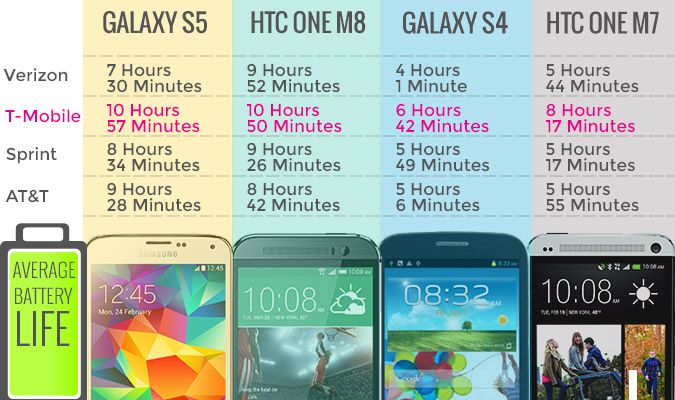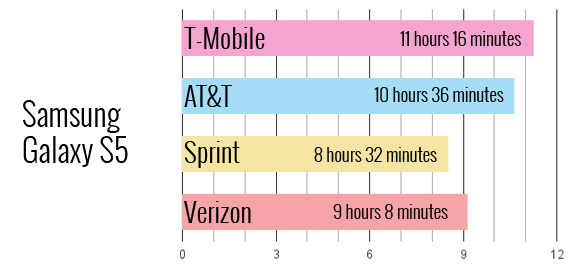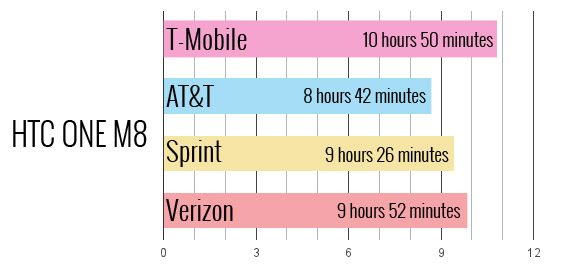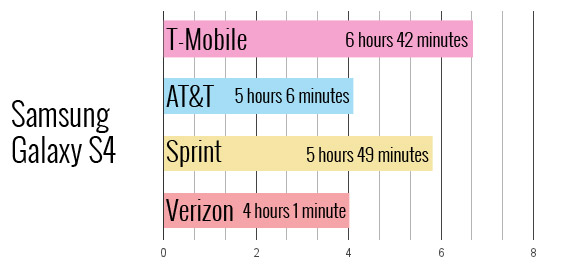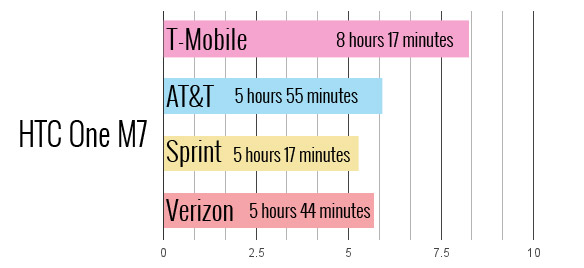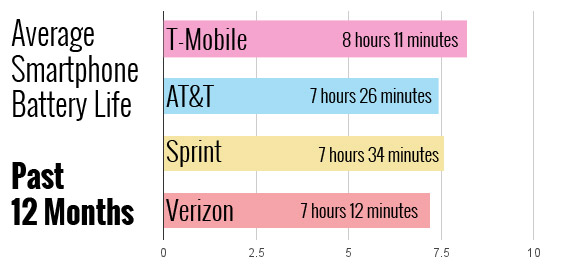Tests Show T-Mobile Smartphones Offer Most Battery Life
In the course of testing smartphones, we've come across a curious consistency. On our battery life test, T-Mobile phones tend to outlast the same devices from other carriers, sometimes by more than two hours. For instance, the T-Mobile Galaxy S5 lasted 10 hours and 57 minutes on our test, versus 7:30 for the Verizon version. We've seen this pattern repeat again and again across multiple handsets -- which is something shoppers might want to keep in mind when choosing a provider.
The Laptop Mag Battery Test is an Android app that surfs 50 popular Web sites, pausing for 60 seconds on each page, until the phone's battery runs out. For smartphones, we turn off Bluetooth and NFC and set the brightness to 150 nits. We also turn off Wi-Fi, so that the phone uses only the carrier's network, and make sure that it's receiving at least 3 bars of service.
Results on Four Popular Phones
MORE: 10 Smartphones with the Longest Battery Life
The T-Mobile version of the Samsung Galaxy S5 lasted 10:57, almost an hour and a half longer than the AT&T Galaxy S5, and more than three hours longer than the Verizon Galaxy S5.
The T-Mobile HTC One M8 endured for 10 hours and 50 minutes, nearly an hour longer than the Verizon HTC One M8, and two hours longer than the AT&T version (8:42) of the same handset.
We started noticing an endurance delta between T-Mobile and other carriers months ago. Even the T-Mobile S4 lasted 6 hours and 42 minutes, more than an hour longer than the next closest device on Sprint (5:17).
T-Mobile enjoyed a similar battery life advantage with the HTC One M7. The Uncarrier's version lasted 8 hours and 17 minutes, which is more than two hours longer than the AT&T HTC One M7 (5:55).
Sign up to receive The Snapshot, a free special dispatch from Laptop Mag, in your inbox.
Historical Trend
The results we saw on the HTC One M7, HTC One M8, Galaxy S4 and Galaxy S5 were consistent with a trend we've been seeing for at least 3 years. In the past 12 months, T-Mobile phones have averaged 8 hours and 11 minutes on our battery tests while Sprint averaged 7:34, AT&T averaged 7:26 and Verizon phones lasted for 7:12.
Combining the past 36 months of Laptop Mag smartphone reviews, T-Mobile averaged 7:26, nearly an hour longer than its nearest competitor, Sprint (6:35). Verizon and AT&T bring up the rear over 36 months, with times of 6:31 and 6:26 respectively. However, many Sprint phones we reviewed over the past 3 years were not LTE-capable, making that carriers numbers look a little better than they should.
Testing Another Location
After compiling these results, we wondered whether the delta in battery life was limited to the New York / New Jersey area where we had run all of our prior tests. So we sent all four carrier versions of the Galaxy S5 to a tester in Chicago who also ran our test, with similar results. The T-Mobile Galaxy S5 lasted 11 hours and 16 minutes on our battery test, 40 minutes longer than the next-highest, AT&T (10:36), and over two hours longer than Verizon (9:08) and Sprint (8:32).
What's the Reason?
While we don't know for certain why T-Mobile phones last longer on a charge, there are some strong possibilities. T-Mobile's network could be more efficient at sending and receiving data because of the bands it uses, or maybe there are far fewer customers on its LTE network, easing the strain. Another possibility is that T-Mobile tends to pre-load less bloatware on its flagship devices relative to the other carriers.
When reached for comment, T-Mobile supplied this somewhat vague response:
T-Mobile’s innovative lineup of devices must meet a high standard of requirements to ensure optimal battery performance. These are defined by common usage profiles for the device that require optimized performance standards. We work with our OEM partners to identify the data transfer, screen enablement and other functions that have an impact on the battery life in order to reduce the background process that impacts overall performance. We also limit the number of preloads on devices and we work closely with developers of these applications to ensure they have optimal performance and minimal impact on battery life. We are proud of what we have been able to achieve in terms of providing customers with the latest and greatest 4G LTE devices and will maintain our strict device testing procedures to ensure optimal performance.
It's certainly true that T-Mobile limits the preloaded software on its devices. In our Galaxy S5 bloatware removal guide, we identified just two apps that we suggested users remove: T-Mobile Name ID and T-Mobile TV. Compare that list to seven unwanted apps on the Verizon S5, as well as eight other options we said users should only consider keeping.
However, a cleaner software load likely doesn't account for such a big difference in battery life from one carrier to the next. There's something else at play here. Whatever the reasons, we're certainly not complaining.
Michael was the Reviews Editor at Laptop Mag. During his tenure at Laptop Mag, Michael reviewed some of the best laptops at the time, including notebooks from brands like Acer, Apple, Dell, Lenovo, and Asus. He wrote in-depth, hands-on guides about laptops that defined the world of tech, but he also stepped outside of the laptop world to talk about phones and wearables. He is now the U.S. Editor-in-Chief at our sister site Tom's Guide, where he oversees all evergreen content and the Homes, Smart Home, and Fitness/Wearables categories for the site..
